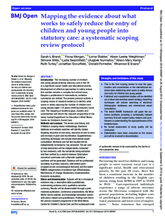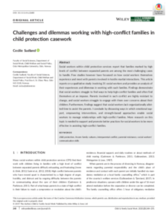

Displaying 761 - 770 of 1646
The present protocol outlines a scoping review of research evidence to identify what works in safely reducing the number of children and young people (aged ≤18 years) entering statutory social care.
This article explores the findings of a study on the role of the social worker in adoption with a focus on ethics, concentrating on the perspectives of adopted people, birth parents, and adoptive parents.
This open access paper [from the Child & Family Social Work special issue on teenagers in foster care] reports on findings from the first study of LGBTQ young people in care in England and focuses on the nature of foster carers' experiences and perspectives on caring for LGBTQ young people.
This paper [from the Child & Family Social Work special issue on teenagers in foster care] reports findings from the first UK study into the experiences of unaccompanied asylum‐seeking young people in the UK, describing issues arising from initial assessment and preparation for fostering and the ways in which young people and foster carers adjusted to their lives together.
The aim of this article [from the Child & Family Social Work special issue on teenagers in foster care] is to account for and discuss support to young care leavers within the comparable welfare regimes of Norway and Sweden and to explore key differences between these 2 countries.
This article reports on a qualitative study involving 31 social workers and provides an analysis of their experiences and dilemmas in working with families marked by high levels of conflict between separated parents.
This article reports on a qualitative study, which sought to retrospectively understand the contribution family group conferencing (FGC) makes to longer‐term outcomes for children at risk of entering State care and their families.
This paper explores how the principle of linked lives can illuminate our understanding of how relationships positively influence the educational journeys of adults with care experience over time.
This paper explores how the principle of linked lives can illuminate our understanding of how relationships positively influence the educational journeys of adults with care experience over time.
This open access article reports on a qualitative study, which sought to retrospectively understand the contribution family group conferencing (FGC) makes to longer‐term outcomes for children at risk of entering State care and their families.


